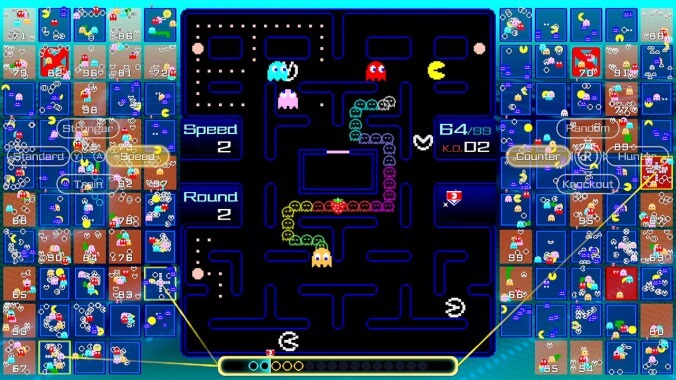Pac-Man 99 misses the points

Every Friday, A.V. Club staffers kick off our weekly open thread for the discussion of gaming plans and recent gaming glories, but of course, the real action is down in the comments, where we invite you to answer our eternal question: What Are You Playing This Weekend?
One of the appeals of the battle royale formula, so prevalent in online gaming in recent years, is that it boils success down to a simple binary. You’re either alive, in which case: Hooray. Or you’re dead, and the hordes of pre-teen jackals are already picking your corpse clean in search of more Fortnite building materials. You might be trailing in equipment or map position, but there’s no “losing” in a game like PUBG or Apex Legends: You’re either winning, or you’re dead.
The problem with this stark reality, though, is that it cuts off certain previously important metrics of success, in service of this survive-over-all mentality. You might crow about your killcount in a game of Call Of Duty: Warzone, but if you get shot in the back at the last minute by someone who’s been hiding behind a shipping container the entire game, well, you still lost, and they still won. At their core, these games aren’t about playing well, but about playing longest. And that’s a problem, when it comes to a game like Pac-Man 99.
Released this Wednesday, Pac-Man 99 is Nintendo’s latest freely offered attempt to get players on the hook for its Nintendo Switch Online program (as though being able to hunt with your buddies in Monster Hunter Rise wasn’t service enough). Following in the footsteps of the diabolically brilliant Tetris 99, and the less successful Mario 35, PM99 once again pits the player against 98 other Pac-Men, all vying to be the last one standing. As with other games in this odd little series, effective play allows you to send obstacles at your distant opponents, filling their fields with ghostly Pac-People who can slow down, and even kill them. Last Pac chomping wins.
In one sense, Pac-Man 99 is a clear evolution of many of the trends that Bandai Namco has applied to the classic Pac formula since Pac-Man Championship Edition arrived back in 2007, massively speeding up the old-school gameplay by eliminating discrete rounds in favor of ever-increasing waves of complexity and speed. (It especially lifts concepts from Championship Edition 2, most notably the ability to generate massive trains of ghosts to consume in one widespread orgy of pixelated undeath.) Where it falls apart, though, is in failing to recognize that Pac-Man is not, at core, a game about survival. Instead, it’s all about the points.
Barring the “whoops, there I go hitting the killscreen” types, death is a natural part of the Pac-Man process. You run the board, you rack up points by gulping down fruit and combo-ing ghosts, you die, and then, hopefully, that stock of points has scored you a couple of extra lives in the meantime to keep the run going. The result is iterative—good play buys you the ability to recover from mistakes, allowing for a cycle of success. The original Super Mario Bros. is similar, with coins and 1-ups keeping you in the game even after a bad jump or obnoxious enemy robs you of your precious fire flower. Of the three games Nintendo has applied the online battle royale formula to, only Tetris is a one-shot affair—and that might help explain why it’s been such a better fit for a treatment that prizes staying in the game above any other sort of successful play. (Although also, Tetris is probably just a better base game than Pac-Man, which is why it’s needed less refinement over the years.)
Like all of the 99/35 games, Pac-Man 99 is undeniably neat. The confusion on the screen is visually stimulating, and the base maze running remains fun. (There’s also a whole strategy element we’re still trying to wrap our heads around, re: the game’s four distinct power-up modes.) But by cutting out a core element of the Pac-Man formula—the accrual of points, whether in service of extra lives, or just as an end unto themselves—99 loses touch with what has made that little yellow puck such an enduring icon for the last 41 years. After all, not everything needs to be a matter of life and death.